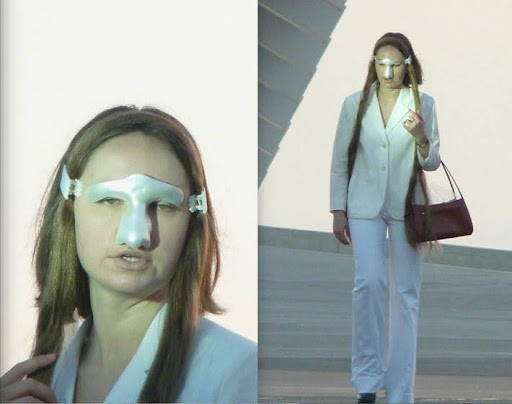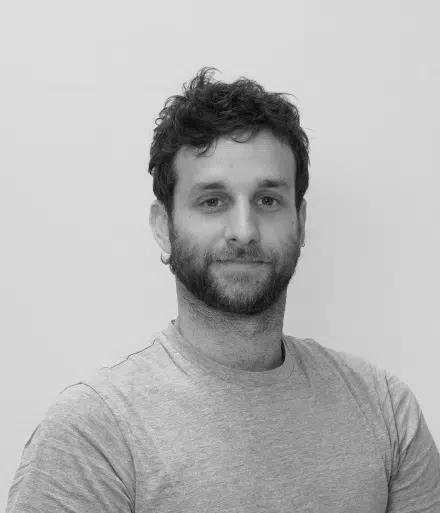Syllabus⇝
Students will be introduced to practical first-person design methodologies by living with their own ideas. Following a series of introductory texts by a diverse group of researchers, thinkers, artists and makers such as Marshal McLuhan, Haila Koskela, Sandy Stone, Donna Haraway, Sophie Cale and Jill Magid, students will be encouraged to develop and embody a series of prostheses iterations under their own agency and rationale. The final delivery comprises a short documentary or article, besides all the developed prototypes and prostheses. The course includes lectures and Q&A’s by Saúl Baeza and Thomas Twaites.
Keywords: Self, Agency, Surveillance, Identity, Prototyping, Discipline, Desire
Learning Objectives⇝
- 1st Person Perspective design and research methodologies
- Self agency
- Critical prototyping
- The work of being watched
- Staying with the trouble
Schedule⇝
12:00 to 14:00
Activities: Course Introduction + dynamics + objectives
Living with your own ideas, designing Identity Prostheses
1st Prosthesis briefing – After Marshal McLuhan and Haila Koskela
9:30 to 13:30
Activities:
(9:30 – 11:00) 1st Prosthesis short presentations (individual)
(11:00 – 13:00) Thomas Twaittes (Author of GoatMan) Online Lecture + Q&A
(13:00 – 14:30) 2nd Prosthesis briefing – After Sandy Stone and Donna Haraway
9:30 to 13:30
Activities:
(9:30 – 11:00) 2nd Prosthesis short presentations (individual)
(11:00 – 12:00) 3rd Prosthesis briefing – After Sophie Cale and Jill Magid
(12:00 – 13:30) 3rd Prosthesis development
14:30 to 16:30
Activities:
(14:30 to 16:30) The Detective – Surveillance documentation exercise
11:30 to 13:30
Activities:
(11:30 – 13:00) 3rd Prosthesis + Documentary/Article short presentations
(13:00 – 13:30) Closing
Methodological Strategies⇝
- Case studies
- Workshops
- Lectures
- Group discussions
- Prototyping
- Project-based learning
- Team-based learning
- Gamification
- Role-playing
Deliverables⇝
- Prototipes
- Short film
- Publication
Grading Method⇝
Class discussion and questions (formative), personal feedback (formative), attendance and participation (summative), deliverables including presentation and video (summative), personal reflections (summative).
| Percentage | Description |
|---|---|
| 20% | Participation |
| 30% | Prototype development |
| 30% | Short film/publication |
| 20% | Personal reflections |
European Credit Transfer and Accumulation System (ECTS)
2 ECTS
Additional Resources⇝
Documentaries: Emad Burnat and Guy Davidi. 2011. 5 broken cameras.
Books: Thomas Thwaites. 2016. GoatMan. How U took a holiday from being human. Princeton Architectural Press. Mark Andrejevic 2004. Reality TV. The Work Of Being Watched. Critical Media Studies: Institutions, Politics and Culture. Series Editor Andrew Calabrese. University of Colorado. Elise Morrison. 2016. Discipline and Desire. Surveillance Technologies in Performance. University of Michigan Press. Allucquére Rosanne "Sandy" Stone. 1996. The War of Desire and Technology at the Close of the Mechanical Age. MIT Press. Donna J. Haraway. 2016. Staying with the Trouble. Making Kin in the Chthulucene. Duke University Press. Erving Goffman. 1956. The Presentation Of Self Everyday Life. Random House. Sasha Costanza-Chock. 2020. Design Justice: Community-Led Practices to Build the Worlds We Need. MIT Press. McKenzie Wark. 1994. A hacker Manifesto. Harvard University Press Alfonso Matos (ed). 2023.Who Can Afford To Be Critical? An inquiry into what we can’t do alone, as designers, and into what we might be able to do together, as people. Set Margins. Andreas Malm. 2021. How to Blow Up a Pipeline: Learning to Fight in a World on Fire. Verso Books. Benjamin H Bratton. 2015.The Stack: On Software and Sovereignty. MIT Press Paul B. Preciado. Testo Yonqui. 2020. Anagrama.
Articles:
Saúl Baeza, Ron Wakkary, Kristina Andersen, and Oscar Tomico. 2021. Exploring the Potential of Apple Face ID as a Drag, Queer and Trans Technology Design Tool. Design- ing Interactive Systems Conference 2021. Association for Computing Machinery, New York, NY, USA, 1654–1667. DOI:https://doi.org/10.1145/3461778.3461999
Saúl Baeza, Ron Wakkary, Kristina Andersen, and Oscar Tomico. 2023. About being an “influencer” or how to exploit the tool of the oppressor for our own expression. In Proceedings of the 2023 ACM Designing Interactive Systems Conference (DIS '23). Association for Computing Machinery, New York, NY, USA, 934–945. https://doi.org/10.1145/3563657.3596091
Saúl Baeza, Kristina Andersen and Oscar Tomico. 2022. Designing hair. DRS2022: Bilbao, 25 June - 3 July, Bilbao, Spain. https://doi.org/10.21606/ drs.2022.649
Additional Resources⇝
- Notebook / Pen / Pencil
- Phone with Camera (or photography/video camera)
- Computer (if you have one)
- Extra materials will be needed during the development of the course (TBD by each student)
Faculty⇝
Saúl Baeza is DOES and MAYBE Creative Director, VISIONS BY Founder and Editor-in-chief and VIBE content director. While lecturing at Elisava Barcelona University of Design and Engineering he also researches functional and digital identities as part of the “Making with..." Research Group (TU Eindhoven Research) and "Futures Now" Research Group (Elisava Research). Saúl is the co-director of the Master in Design For Emergent Futures (MDEF), organised by the Institute for Advanced Architecture of Catalonia (IAAC) and Elisava Barcelona School of Design and Engineering, in collaboration with the Fab Academy. Saúl has been visiting professor and lecturer at international universities, educational institutions and cultural venues such as Harvard GSD, Central Saint Martins and London College of Communication (UAL), Institute for advanced Architecture of Catalonia (IAAC), RMIT University Melbourne, Rhode Island School of Design, Pascual Bravo University in Medellín, Sónar+D, Victoria&Albert Museum, CCCB and DHUB, among others.

